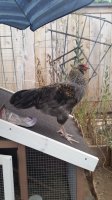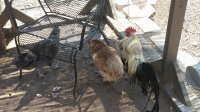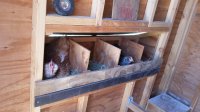bald Rooster
Songster
Hermaphrodite
From Wikipedia, the free encyclopedia
For other uses, see Hermaphrodite (disambiguation).
Historically, the term hermaphrodite has also been used to describe ambiguous genitalia and gonadal mosaicism in individuals of gonochoristic species, especially human beings. The word intersex has come into preferred usage for humans, since the word hermaphrodite is considered to be misleading and stigmatizing,[3][4] as well as "scientifically specious and clinically problematic".[5]
A rough estimate of the number of hermaphroditic animal species is 65,000.[6] Since the estimated total number of animal species is 8.6 million, the percentage of animal species that are hermaphroditic is about 0.7%. Arthropods are the phylum with the largest number of species. Most hermaphroditic species exhibit some degree of self-fertilization. The distribution of self-fertilization rates among animals is similar to that of plants, suggesting that similar processes are operating to direct the evolution of selfing in animals and plants.[6]
From Wikipedia, the free encyclopedia
For other uses, see Hermaphrodite (disambiguation).
In biology, a hermaphrodite is an organism that has reproductive organs normally associated with both male and female sexes.[1] Many taxonomic groups of animals (mostly invertebrates) do not have separate sexes.[2] In these groups, hermaphroditism is a normal condition, enabling a form of sexual reproduction in which either partner can act as the "female" or "male". For example, the great majority of tunicates, pulmonate snails, opisthobranch snails and slugs are hermaphrodites. Hermaphroditism is also found in some fish species and to a lesser degree in other vertebrates. Most plants are also hermaphrodites.Historically, the term hermaphrodite has also been used to describe ambiguous genitalia and gonadal mosaicism in individuals of gonochoristic species, especially human beings. The word intersex has come into preferred usage for humans, since the word hermaphrodite is considered to be misleading and stigmatizing,[3][4] as well as "scientifically specious and clinically problematic".[5]
A rough estimate of the number of hermaphroditic animal species is 65,000.[6] Since the estimated total number of animal species is 8.6 million, the percentage of animal species that are hermaphroditic is about 0.7%. Arthropods are the phylum with the largest number of species. Most hermaphroditic species exhibit some degree of self-fertilization. The distribution of self-fertilization rates among animals is similar to that of plants, suggesting that similar processes are operating to direct the evolution of selfing in animals and plants.[6]








